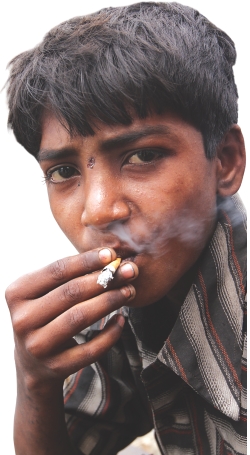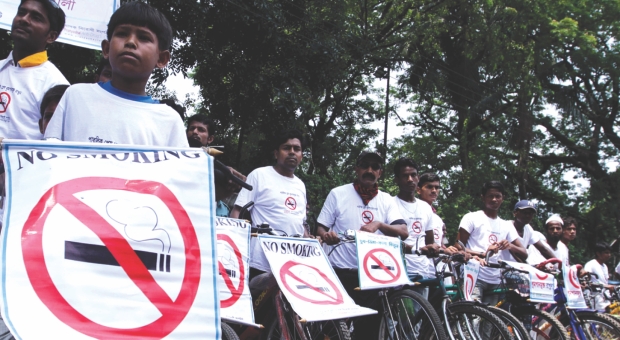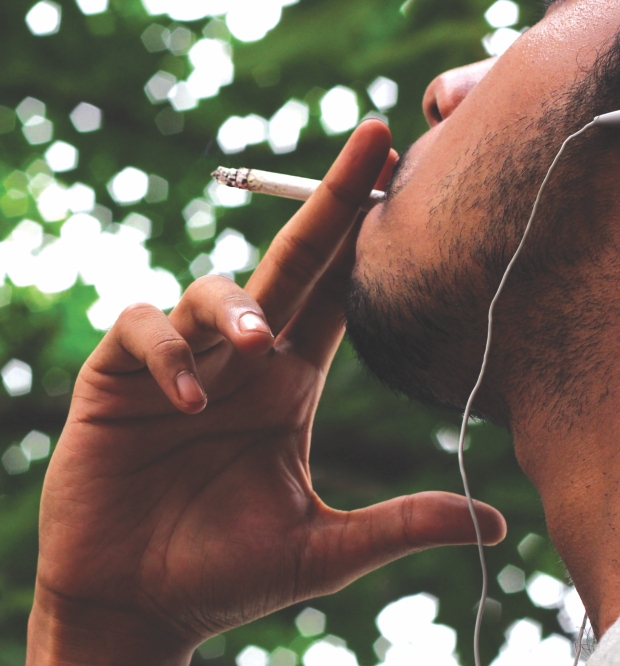| Home - Back Issues - The Team - Contact Us |
 Linking Young Minds Together |
| Volume 5 | Issue 31 | August 07, 2011 | |
|
Spotlight
To Smoke or Not: Sumaiya Ahsan Bushra Smoking -- for some it's a need, a hobby, a pleasure or simply a symbol of status. But behind this dark temptation lies a tar-filled truth which cannot just ruin lives but can kill. Yes, today thousands of young people belonging to countries like Bangladesh have to pay a high price for smoking. However, what is baffling is that for a nation like Bangladesh, more than half of the youth population smoke. Has it become the nation's favourite past-time or is it just an addiction one can't seem to get rid off? Experts and psychologists have made endless efforts to explain this disease. Professor Hamida Akhter, Department of Psychology, University of Dhaka, says, “Smoking is a learned behaviour pattern; young people smoke because they want to identify themselves with others in their surroundings, mostly their friends. Some young boys smoke because they want to look manly while other adolescents believe that smoking portrays a high profile.”
Although, peer-influence may seem to be one of the primary factors behind this increase in number, other reasons may include depression due to family problems or even imitating a member of the family. Often it is said, that in a patriarchal society like Bangladesh, the father is the role model, who the children often try to follow. So, if the father is a smoker, it is likely that children will also pick up the habit at some point because they often tend to believe that if smoking wasn't a good habit then why the head of the family would indulge in it. Sometimes, due to family problems the children suffer and as a result, seek refuge in habits like smoking. “I use it, crave it and need it. Cigarette to me is what chocolate is for some. I started smoking ever since I was 12 years old. It initially started because I had some problems with my family. It releases tension and frees me from all kinds of frustration,” opines Shaila, a student of a private university. To tackle this problem, parents have to deal with it carefully. Some parents take strict measures while others handle it in a more submissive manner by making them understand. “Children just don't like to reveal the truth when it comes to smoking. But it wasn't difficult for me to find out that my son was smoking. I found out by simply sniffing his tee-shirts and the smell of tobacco is such that stays longer than normal. At times, I also checked his trash can where he discarded the cigarette butts. However, at the end of the day, the best thing to do is to talk to them freely about it or to make them understand indirectly that this habit isn't good,” explains Rahmat Ara Begum, a working parent.
In most cases, people start smoking from the very beginning of their teenage years. There is no doubt that the tobacco companies' propaganda is one of the main reasons which contributes to the increase in the number of teenage smokers. Some studies revealed that tobacco companies are employing particular advertising techniques which would attract their long term consumers -- teenagers. For instance, some companies even affiliate themselves to elements that young people can relate to -- for instance music, thus organising musical shows and concerts. As one is already aware tobacco contains nicotine which increases user dependency day by day. In addition, another reason why young people are encouraged to smoke is because of the increase in availability of cigarettes at local shops. In Bangladesh, in front of many schools and universities, tobacco is being sold at the shops where students can avail them easily. In most situations, the tobacco sellers do not refuse to sell cigarettes to 13-15 year olds. In an elaborate study conducted by Work for a Better Bangladesh (WBB Trust), it shows that students know more about the cigarette brands than the dates of the Independence Day or Victory Day! Further on, these days a lot of students smoke because they believe their lives have become too monotonous. The hectic and constant examinations in most public and private universities keep them on leash round the year. The carefully designed curriculums used in most universities these days have been engineered to function as drilling and killing machines which causes the students to go insane at the end of the semester. Therefore, this has also been identified as one of the prime reasons for smoking. “I smoke at least 20 cigarettes a day during my final exam. It helps me feel less stressed out,” explains Arif, a final year Computer Science Engineering student. “Last semester, I lost count of how many packets my group mates and I finished every night while finishing our human resource project. It gets really tough; to stay up all night and write 500 pages and then work on a presentation, it is difficult,” said Amar, a Business student.
However, it is indeed alarming, that smoking is now being considered a hobby and at times a symbol of status by many young people in our country. As Jamil, a Business student says, “I smoke because there isn't much to do in this country. This is a way we can relax with our friends.” While, Ambareen, another student says, “When I am hanging out with my male friends, I occasionally take a few puffs. Its fun, it makes me feel less bothered about things.” “I smoke because it makes me look cool,” says Samantha in a nonchalant manner. To this notion, Professor Hamida Akhter says, “These students are mostly from the upper strata of the society. They think it is a way they can show-off. It gives the impression that they don't care. Some of the female students think it's a way of empowerment, being equals with the male in the society. But what they fail to understand is the fact that this is not the correct way to show empowerment.”
Today, some of the anti tobacco organisations are working with the public and private university authorities to declare smoke free campuses. Such as, Pratyasha, a leading volunteer organisation worked with Jagannath University and declared them as a smoke free campus. In addition, not only in Dhaka, but in many districts and sub districts, task forces for tobacco control law implementation was created to make educational institutions smoke free. For instance in Gangni (a sub district of Meherpur) task forces declared all educational institutes smoke free, with the advocacy efforts by Bangladesh Tamak Birodhi Jote. At a glance, the young in the society seem to be fighting an inner conflict, which can be termed as an inner war between being a 'corporate' and a healthy human being. On one hand, they have the privilege to become 'trendy' and 'classy' upon grabbing packs of cigarettes with their friends, while on the other they decide to watch on while becoming victims to second-hand smoking. The authorities and also individuals in society must come up with innovative ways to keep the young students feel useful enough to do something constructive or entertaining in a healthy way. After all, the authorities must do everything they can to keep the future of this nation safe, healthy and happy, otherwise, it wont be long before every one of them escape to a foreign land for a better life.
Copyright (R) thedailystar.net 2011 |
||

 Smoking as an addiction is a common phenomena occurring among both school and university students all over Bangladesh. If one member of a particular friend circle starts to smoke, the other person can get easily influenced, which results in a 'domino effect,' where more people become encouraged to start smoking under the umbrella of peer-pressure. And once this habit is picked up it becomes very difficult to let go of. In most cases, students do not realise what they are doing or how it is going to be detrimental to their health. Some cannot even identify a proper reason behind this addiction. “There is no specific or a good reason for smoking. It is really easy to start smoking but to quit, it is extremely difficult,” says 21-year-old Robin, a student of a private university. In addition, Rocky, a student opines, “Smoking helps me to relax my nerves when I get nervous. I started smoking when I was 18 years old.”
Smoking as an addiction is a common phenomena occurring among both school and university students all over Bangladesh. If one member of a particular friend circle starts to smoke, the other person can get easily influenced, which results in a 'domino effect,' where more people become encouraged to start smoking under the umbrella of peer-pressure. And once this habit is picked up it becomes very difficult to let go of. In most cases, students do not realise what they are doing or how it is going to be detrimental to their health. Some cannot even identify a proper reason behind this addiction. “There is no specific or a good reason for smoking. It is really easy to start smoking but to quit, it is extremely difficult,” says 21-year-old Robin, a student of a private university. In addition, Rocky, a student opines, “Smoking helps me to relax my nerves when I get nervous. I started smoking when I was 18 years old.”

 Colleges and universities, be, it public or private have started to take incentives and measures against smoking. Some of the very reputable educational institutes are setting examples for others by putting the “NO SMOKING” sign all over the campus. Notredame College, Stamford University, Imperial College became smoke free and was formally declared by the authority of Work for a Better Bangladesh (WBB), a smoke free zone. Also, the University Grants Commission (UGC) declared that all private and public universities should set signboards saying, “NO-SMOKING AREA” inside the university campus. On this note, Md Khaled, Secretary of UGC, says, “No strict laws have been declared by the Government as yet. However, leaflets have been circulated to all universities in the beginning of this year, requesting them to make their premises smoke free. In addition, universities that do not have a proper campus were requested to implement the same laws within their premises.”
Colleges and universities, be, it public or private have started to take incentives and measures against smoking. Some of the very reputable educational institutes are setting examples for others by putting the “NO SMOKING” sign all over the campus. Notredame College, Stamford University, Imperial College became smoke free and was formally declared by the authority of Work for a Better Bangladesh (WBB), a smoke free zone. Also, the University Grants Commission (UGC) declared that all private and public universities should set signboards saying, “NO-SMOKING AREA” inside the university campus. On this note, Md Khaled, Secretary of UGC, says, “No strict laws have been declared by the Government as yet. However, leaflets have been circulated to all universities in the beginning of this year, requesting them to make their premises smoke free. In addition, universities that do not have a proper campus were requested to implement the same laws within their premises.”